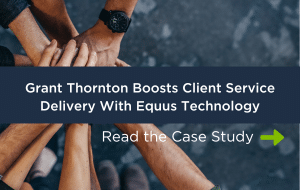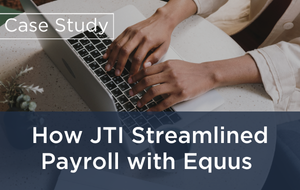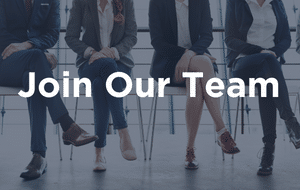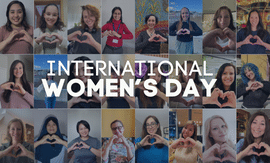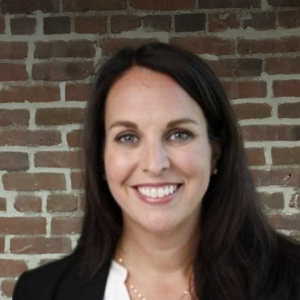 We are excited to welcome Cathy Koslowksi to the team as a senior technology consultant. With nearly two decades of experience at a big 4, Cathy has worked in all aspects of global mobility and is a seasoned global mobility professional and industry speaker. From running global mobility programs to using AssignmentPro as a client, Cathy’s expertise and hands-on approach will play a vital role in bringing innovative solutions to clients. We sat down with Cathy to learn more about her background and what she looks forward to in her new role at Equus. Checkout the interview below.
We are excited to welcome Cathy Koslowksi to the team as a senior technology consultant. With nearly two decades of experience at a big 4, Cathy has worked in all aspects of global mobility and is a seasoned global mobility professional and industry speaker. From running global mobility programs to using AssignmentPro as a client, Cathy’s expertise and hands-on approach will play a vital role in bringing innovative solutions to clients. We sat down with Cathy to learn more about her background and what she looks forward to in her new role at Equus. Checkout the interview below.
Tell me a little bit about yourself and your experience in global mobility.
I’ve been very fortunate in my Global Mobility career to have experienced almost all facets of mobility and to really craft my own path. I spent 15 years with Deloitte starting out in a co-sourcing group, managing programs on behalf of our clients. I then moved into the Global Employer Services (GES) Technology team where I spent time implementing assignment management software. From there, I pivoted toward the RFP and planning processes, answering RFP’s that related to any of the software we sold (tax, cost projections, mobility, employee experience, etc.) and then attending orals and presenting the software. I spent almost a year on a short term assignment in London working with our UK team to develop a global compensation management system and the processes around that system. I also had a short-term assignment in Brussels, BE under these roles. While in Belgium, I began to work with the global service line leader to become her chief of staff working on global strategy projects.
 I left Deloitte to work with Hewlett Packard Enterprise (HPE) as their expat tax leader and over special projects. During my time with HPE, we focused on process enhancements and on M&A activities, including the creation of a new company, DXC Technologies and the spin of HPE’s software business to Micro Focus. While at Micro Focus, I worked globally to merge two programs together that were very different in terms of risk tolerance and the desire for defined processes.
I left Deloitte to work with Hewlett Packard Enterprise (HPE) as their expat tax leader and over special projects. During my time with HPE, we focused on process enhancements and on M&A activities, including the creation of a new company, DXC Technologies and the spin of HPE’s software business to Micro Focus. While at Micro Focus, I worked globally to merge two programs together that were very different in terms of risk tolerance and the desire for defined processes.
From there I joined Jacobs Engineering as their Global Mobility Director. Jacobs had recently acquired CH2M and had been trying to harmonize the two companies for over a year and were also in the midst of selling their nuclear business to Worley Parsons. Jacobs and CH2M were worlds apart in culture and risk tolerance and in the structure of the mobility teams. One was full service with regional managers and consultants while the other was run globally out of the US with a shared service center in Poland. By the time of my departure, we had taken the best of both worlds to create a world class program in terms of team structure, project consulting processes, policy and procedures.
How did you decide you wanted to pursue a career in global mobility?
Two things, first, my grandmother instilled in me a massive travel bug. She knew that the best way to understand the world was to experience it. I always knew I wanted a career with an international aspect.
Second, many years ago, I was working as a finance manager for an advertising agency focused on their international programs. I realized how small the world really is and that I loved working with my colleagues all over the world. My best friend worked for Deloitte, in their Global Employer Services group and got me an interview. Completely changed the direction of my career and have been able to travel the world, live in 3 countries and instill a global perspective in all things I do.
What do you think the future of global mobility looks like in a post-Covid world?
I’m not sure there will ever be a post-Covid world. The last couple of years have been a seismic shift in Mobility. I was with Jacobs Engineering when Covid hit, we spent the next few weeks calling all our mobile population to make sure that (1) they were ok, (2) did they feel safe remaining in their assignment locations and (3) did they want to remain there. The vast majority of them did.
In 2020, the world came together in much the same way. Immigration authorities in most locations automatically extended work permits and/or forgave people overstaying; Tax authorities also forgave over stays due to COVID; companies focused on the wellbeing of their employees.
2021 was, in many ways, a much more difficult year: entry requirements started to change and fluctuate globally; ships getting stuck in the Suez Canal exacerbated an already difficult shipping industry; housing was difficult to obtain, etc. Mobility teams had to work with businesses (A LOT) to reset expectations around how quickly they could get someone landed and working.
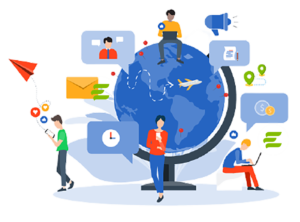 Where do we go from here? The war for Talent will continue; it will create the need for a greater diversity and flexibility of policy types so that each of those talented employees are enticed to take that assignment. Personalization will be important, but so will communication. The pre-assignment processes, particularly immigration and shipping, will continue to take longer than in the past while immigration authorities are clearing back logs of cases. In the case of shipping household goods, the industry has not caught up with the need for more proactive communication and are fighting their own war for talent. This also drives the need for better technology – automation of processes, dashboards to educate mobility stakeholders about the cost of assignments, historical and current timelines, and self-service capabilities will be paramount.
Where do we go from here? The war for Talent will continue; it will create the need for a greater diversity and flexibility of policy types so that each of those talented employees are enticed to take that assignment. Personalization will be important, but so will communication. The pre-assignment processes, particularly immigration and shipping, will continue to take longer than in the past while immigration authorities are clearing back logs of cases. In the case of shipping household goods, the industry has not caught up with the need for more proactive communication and are fighting their own war for talent. This also drives the need for better technology – automation of processes, dashboards to educate mobility stakeholders about the cost of assignments, historical and current timelines, and self-service capabilities will be paramount.
Remote work, alternative work arrangements, business travel, virtual assignments, these are all assignment types that mobility teams will be expected to manage along with the more traditional Long/Short term assignments and various one-way moves.
The other area I see mobility changing is around sustainability. Many companies are developing or have already developed ESG goals to track their sustainable business practices. Mobility will be expected to report on the ESG costs of an assignment, and offer more sustainable choices, i.e., smaller shipments, donations of goods to charity, leveraging online forms and electronic signatures over wet signatures and paper. Measuring and tracking the carbon cost of flights, household goods shipments and storage options will become needed. I also think this is an area that mobility teams will need to push mobility vendors in – using sustainable packaging, lighting, and cars, recycling boxes, furniture, and providing information about recycling in temporary living spaces are areas that KPI’s will move.
What is the best advice you ever received in your career?
A partner at Deloitte told me to never let fear be a deciding factor in a decision. It seems simple enough, but often we let ourselves choose not to do something due to fear of the unknown. I moved to Atlanta, London, and Brussels in my career, and I have traveled alone globally. I always try to take at least a day to really explore a new country or city.
Taking on a new role, leaving the safe confines of a company you worked at for 15 years, moving up the career ladder, traveling to new countries or moving for your company – make your choices based on your goals, your desires and how you envision your life and your future.
The second is not really advice, but rather a quote I read in a marketing class at university.
“Nobody who bought a drill actually wanted a drill. They wanted a hole. Therefore, if you want to sell drills, you should advertise information about making holes – NOT information about drills” – Perry Marshall.
I have gone back to this quote time and time again throughout my career – while I was in client service, and when I was the client getting buy in from senior leadership to make strategic changes. When setting a goal for your program, consider why you need it, what will it take to gain the consensus to accomplish your goals. It reminds me to stop and think about a goal from multiple perspectives.
What are you most excited about in your new role at Equus?
 I started my career in client service, dealing with new clients or new projects almost weekly. When I left Deloitte, it took me a little while on the client side to get my bearings – I was no longer the consultant, I was the person who had to make it happen – find the funding, create the processes and enroll others into my vision. It took a mindset switch, but I really loved what I was creating and I would get to see it through to the end.
I started my career in client service, dealing with new clients or new projects almost weekly. When I left Deloitte, it took me a little while on the client side to get my bearings – I was no longer the consultant, I was the person who had to make it happen – find the funding, create the processes and enroll others into my vision. It took a mindset switch, but I really loved what I was creating and I would get to see it through to the end.
Over time, I’ve realized that I really miss working with multiple clients, on multiple projects and getting back to helping them improve their programs through technology and the efficiencies that can be gained from more efficient data and tracking. I am excited to do more of this in my new role at Equus, and look forward to working together with clients and make an impact.
Click here to checkout the leadership team at Equus Software.


